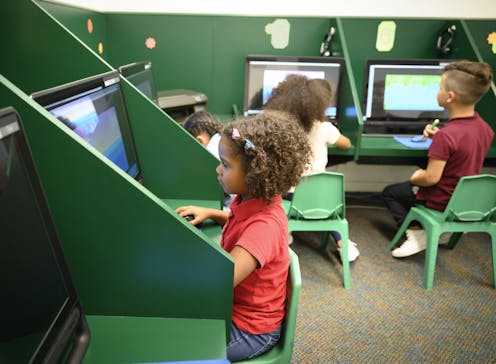Some kindergartners are more likely later to be heavy users of online tech, according to new researc
Too much screen time doesn't leave enough time for other important parts of growing up. Predicting which little kids will likely grow into heavy tech users could help target educational campaigns.

The Research Brief is a short take about interesting academic work.
The big idea
Specific groups of kindergartners in the U.S. are more likely to be frequent users of social networking, online gaming or messaging by the end of fifth grade, according to our new study in the journal Child Development. My colleagues and I identified these groups based on analyses of data from 10,460 U.S. schoolchildren followed over six years. Understanding which children are frequent users of online technologies is important because such use may displace developmentally appropriate activities including physical activity, sleep and independent book reading.
We found that kindergarten children who were aggressive or often acted out were more likely to use these online technologies multiple times a day at the end of elementary school, as were children from low-income families. Black children were also more likely to later be frequent users of online technologies.
Boys were more likely to be frequent users of online gaming, while girls were more likely to be heavy users of social networking and messaging.
Children of parents who emphasized early literacy activities and who set limits on watching TV were less likely later to be frequent users of online technologies.
Why it matters
Children’s increasingly frequent use of online technologies – such as Instagram, Twitter, Facebook and other social networking apps; gaming through Xbox, PlayStation or smartphones; and messaging via WhatsApp, Snapchat or texts – has parents, educators, and health providers worried, for good reason.
Frequent use of online technologies may be displacing developmentally beneficial activities – think physical activity, sleep, parent-child interactions and independent book reading. Children who use online technologies many times a day are more likely to be sedentary, sleep-deprived and overweight; to struggle academically or behaviorally in school; and to self-report poorer quality of life and mental health. Children’s use of online technologies has also greatly increased during the COVID-19 pandemic.
Our study provides new information about which U.S. kindergartners are more likely to later be frequent users of online technologies. This new information can help inform public health campaigns for families most at risk. Routines that promote optimal levels of online technology use, physical activity, sleep, book reading and other activities should help children develop physically, cognitively, academically and behaviorally.
What still isn’t known
Our study has limitations. Our results may be conservative because children self-reported how frequently they used online technologies. Data collection ended before the COVID-19 pandemic began.
Our results are not causal. We don’t know for sure why specific groups of children are more likely to later be frequent users of online technologies. We do have some hypotheses, though. Parents in low-income families may allow more screen time as they deal with greater demands on their own time and resources. Parents of kids who act out may turn to electronic devices to pacify their children’s outbursts. Early experiences with racial discrimination may lead Black children to use online technologies frequently to connect with similar peers and express their racial or ethnic identities.
And it’s important to recognize that there’s only limited evidence that children’s use of online technologies causes harm. Any such harms may be limited to frequent users of specific technologies from specific populations. Further study and analysis are needed to examine these relations. In future, online technologies might be designed to promote healthy behaviors including by vulnerable populations.

What’s next
Identifying at this early stage which young children are more likely to later be frequent users of online technologies might help families prevent problematic use.
For example, other research suggests that girls may be especially likely to be harmed by frequent social networking due to increased cyberbullying exposure and feelings of body weight dissatisfaction as well as decreased sleep and exercise. Our study finds that girls are already more likely to be using these technologies a lot by the end of elementary school. Limiting social networking and messaging during this early developmental period may be particularly important.
Setting screen time routines that help children meet recommended guidelines for physical play, sleep, book reading and other beneficial developmental activities may help prevent overuse of online technologies. Limiting children’s access during homework, shared mealtimes and within one hour of bedtime may also help. Families can set rules limiting access to electronic devices. Parents could encourage early literacy activities that help children become independent readers.
Educators and health providers can inform parents about the repeatedly observed negative associations between frequent use of online technologies and children’s development, as well as support and assist families in setting up screen time routines.
Paul L. Morgan does not work for, consult, own shares in or receive funding from any company or organization that would benefit from this article, and has disclosed no relevant affiliations beyond their academic appointment.
Read These Next
The greatest risk of AI in higher education isn’t cheating – it’s the erosion of learning itself
Automating knowledge production and teaching weakens the ecosystem of students and scholars that sustains…
‘Learning to be humble meant taming my need to stand out from the group’ – a humility scholar explai
Humility is a virtue that many people admire but far fewer practice. A scholar describes how a professional…
Do animals have a future on Hollywood sets?
The turn to CGI has sidelined many of the dogs, bears and horses of yesteryear. But ethical questions…






